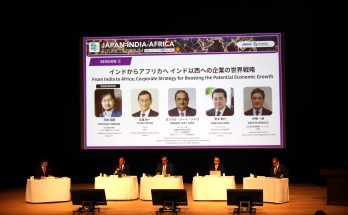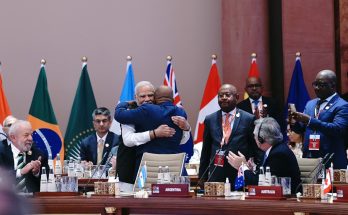 2016 is set to be the year of Africa for India’s diplomacy, with Narendra Modi heading on the first-ever four-nation tour by an Indian prime minister to the continental Africa in decades. PM Modi’s visit, preceded by President Pranab Mukherjee’s visits to Ghana, Cote D’Ivoire and Namibia and Vice-President Hamid Ansari’s trips to Morocco and Tunisia, has raised the bar for India’s diplomatic outreach to Africa, and underscores the emergence of the resurgent continent as an important pole in the country’s foreign policy calculus.
2016 is set to be the year of Africa for India’s diplomacy, with Narendra Modi heading on the first-ever four-nation tour by an Indian prime minister to the continental Africa in decades. PM Modi’s visit, preceded by President Pranab Mukherjee’s visits to Ghana, Cote D’Ivoire and Namibia and Vice-President Hamid Ansari’s trips to Morocco and Tunisia, has raised the bar for India’s diplomatic outreach to Africa, and underscores the emergence of the resurgent continent as an important pole in the country’s foreign policy calculus.
The visit by PM Modi should put a closure to endless complaints by Africa-watchers that for all its much-vaunted anti-colonial solidarity and centuries-old cultural links Indian leaders do not seem to find time to visit Africa. This high-level diplomatic deficit was jarring as the world’s major and emerging powers have been courting the continent, home to some of the fastest-growing economies, with renewed zeal. The series of high-level visits from India to Africa, coming so soon after the substantive India-Africa Forum Summit-III in October 2015, have pitched the India-Africa relations onto a higher trajectory.
Betting on Africa Opportunity
 The importance of Modi’s Africa surge lies in new possibilities of engagement opening up between then world’s fastest growing economy and the African continent looking at a rising India anew. The slowdown of the Chinese economy has severely impacted resource-rich African countries due to a sharp fall in commodity prices, and has goaded them to look at a rising India anew. Upgrading economic relationship with the African continent will be, therefore, on top of Modi’s agenda in all the four African countries. The meeting of the CEOs Forum in South Africa during Modi’s visit to Johannesburg is aimed at scaling up trade and investment between India and the continent’s economic powerhouse. In Tanzania, Kenya and Mozambique, one can expect a political push to expanding economic engagement in areas of infrastructure, transport, agriculture and knowledge industries.
The importance of Modi’s Africa surge lies in new possibilities of engagement opening up between then world’s fastest growing economy and the African continent looking at a rising India anew. The slowdown of the Chinese economy has severely impacted resource-rich African countries due to a sharp fall in commodity prices, and has goaded them to look at a rising India anew. Upgrading economic relationship with the African continent will be, therefore, on top of Modi’s agenda in all the four African countries. The meeting of the CEOs Forum in South Africa during Modi’s visit to Johannesburg is aimed at scaling up trade and investment between India and the continent’s economic powerhouse. In Tanzania, Kenya and Mozambique, one can expect a political push to expanding economic engagement in areas of infrastructure, transport, agriculture and knowledge industries.
Bolstering India’s energy security and food security will also be high on PM Modi’s agenda. In South Africa, the talks will focus on India getting access to clean coal and gasification technologies, which will complement Mr Modi’s efforts to build low-carbon economy. In Mozambique, the focus will shift to hydrocarbons, with Indian companies looking to acquire more energy assets in the Lusophone country. The two sides are expected to sign a pact, which will pave the way for long-term procurement of pulses by India from Mozambique. This will be a bail-out deal for India as prices of pulses are soaring in the country, which can impact overall food inflation.
Spurring Africa’s Resurgence
 Modi’s visit to the African continent will also see India reinforcing its credentials as India’s prime partner in Africa’s resurgence. In all the four capitals Mr Modi is visiting, he is expected to unveil fresh Lines of Credit for a host of developmental projects in areas of infrastructure, education and health. At the third India Africa Forum Summit held in New Delhi in October 2015, India had pledged $10 billion LOC for the African continent, besides an additional grant of $600 million. There will also be broad discussions on advancing ambitious agenda for multi-layered partnership which was crystallised in the 2015 Delhi Declaration.
Modi’s visit to the African continent will also see India reinforcing its credentials as India’s prime partner in Africa’s resurgence. In all the four capitals Mr Modi is visiting, he is expected to unveil fresh Lines of Credit for a host of developmental projects in areas of infrastructure, education and health. At the third India Africa Forum Summit held in New Delhi in October 2015, India had pledged $10 billion LOC for the African continent, besides an additional grant of $600 million. There will also be broad discussions on advancing ambitious agenda for multi-layered partnership which was crystallised in the 2015 Delhi Declaration.
Strategic Partnership
 Besides bilateral visits, the focus of PM Modi’s discussions in African capitals will be on deepening the strategic partnership by enhancing cooperation on cross-cutting issues, including terrorism, UNSC reform, climate change and sustainable development. The stasis in the African Union’s consensus on the UN Security Council reforms has come in the way of pushing ahead with the UNSC expansion. In this context, PM Modi will be looking to get updates on the AU’s position in all the African capitals and seek their support for India’s candidacy for a permanent seat in the UN Security Council. Intensifying counter-terror cooperation with African countries will be a major priority as terror syndicates active across swathes of Africa are suspected to have global connections.
Besides bilateral visits, the focus of PM Modi’s discussions in African capitals will be on deepening the strategic partnership by enhancing cooperation on cross-cutting issues, including terrorism, UNSC reform, climate change and sustainable development. The stasis in the African Union’s consensus on the UN Security Council reforms has come in the way of pushing ahead with the UNSC expansion. In this context, PM Modi will be looking to get updates on the AU’s position in all the African capitals and seek their support for India’s candidacy for a permanent seat in the UN Security Council. Intensifying counter-terror cooperation with African countries will be a major priority as terror syndicates active across swathes of Africa are suspected to have global connections.
 PM Modi’s visit to the four African countries will be incomplete without a high-visibility outreach to the diaspora in these countries. The diaspora outreach event planned in Durban promises to be spectacular, with around 10,000 PIOs eagerly waiting to welcome PM Modi. South Africa is home to nearly 1.2 million-strong Indian diaspora, and has the largest Indian community in the whole of Africa. Under Modi’s watch, diaspora has become an integral part of India’s diplomatic outreach, and PM’s visits to African countries will put the spotlight on the diverse Indian diaspora in the continent.
PM Modi’s visit to the four African countries will be incomplete without a high-visibility outreach to the diaspora in these countries. The diaspora outreach event planned in Durban promises to be spectacular, with around 10,000 PIOs eagerly waiting to welcome PM Modi. South Africa is home to nearly 1.2 million-strong Indian diaspora, and has the largest Indian community in the whole of Africa. Under Modi’s watch, diaspora has become an integral part of India’s diplomatic outreach, and PM’s visits to African countries will put the spotlight on the diverse Indian diaspora in the continent.
Africa’s Choice
Modi’s Africa surge, in short, will be for real and has to be seen in the context of evolving geopolitical equations emerging around the rising continent. Africa has now more partners to choose from, and all of them, established powers as well as emerging players, are courting the continent with a renewed ardour. In the economic arena, China has scored, with its bilateral trade with Africa at least three times more than that of India-Africa trade. This burgeoning economic relationship has provided China enormous clout in many African countries. The clichéd narrative of competition and rivalry between India and China in Africa is a tad overplayed as the two Asian powers have different core strengths and models of engaging Africa. India can’t possibly surpass China in terms of trade volumes in the near term, but Modi’s visit to the four African countries is meant to signal that India is raising the game and is ready to match its rhetoric with resources and core strengths to expand and transform a mutually empowering partnership with the renascent continent.
(Manish Chand is currently CEO & Editor-in-Chief of India Writes Network, www.indiawrites.org, an e- magazine-journal focused on international affairs, emerging powers and Africa. He is Editor of “Two Billion Dreams: Celebrating India-Africa Friendship,” a book capturing myriad facets of India-Africa relationship, and has co-edited “Engaging with a Resurgent Africa (McMillan/ORF),” and “India-Africa Partnership: Towards Sustainable Development” (published by RIS and FIDC, 2015). He has served as Editor of Africa Quarterly, a journal focused on African issues and India-Africa relations).
Author Profile

- Manish Chand is Founder-CEO and Editor-in-Chief of India Writes Network (www.indiawrites.org) and India and World, a pioneering magazine focused on international affairs. He is CEO/Director of TGII Media Private Limited, an India-based media, publishing, research and consultancy company.
Latest entries
 India and the WorldJune 16, 2025Amid Pakistan-Turkey nexus, Cyprus joins India against cross-border terror
India and the WorldJune 16, 2025Amid Pakistan-Turkey nexus, Cyprus joins India against cross-border terror India and the WorldMay 8, 2025Pahalgam payback: India exposes Pakistan’s lies, misuse of religious sites for training terrorists
India and the WorldMay 8, 2025Pahalgam payback: India exposes Pakistan’s lies, misuse of religious sites for training terrorists India and the WorldMay 3, 2025IMEEC provides a democratic alternative to BRI: Italy’s former foreign minister (Interview)
India and the WorldMay 3, 2025IMEEC provides a democratic alternative to BRI: Italy’s former foreign minister (Interview) India and the WorldApril 21, 20253T Template for India-US Mega Partnership
India and the WorldApril 21, 20253T Template for India-US Mega Partnership







